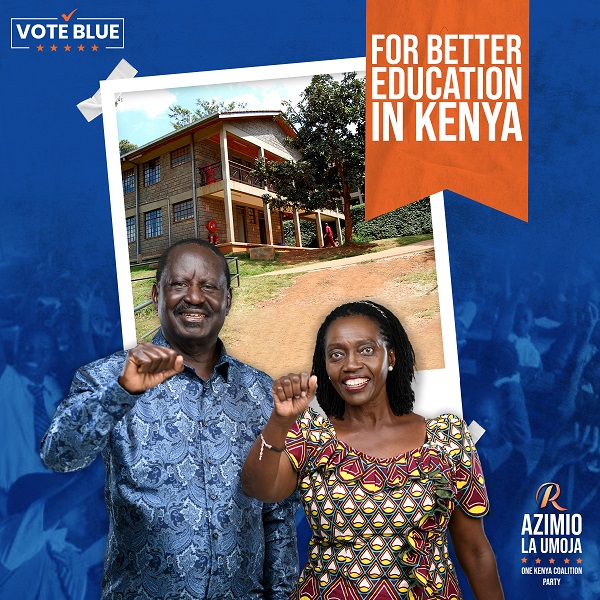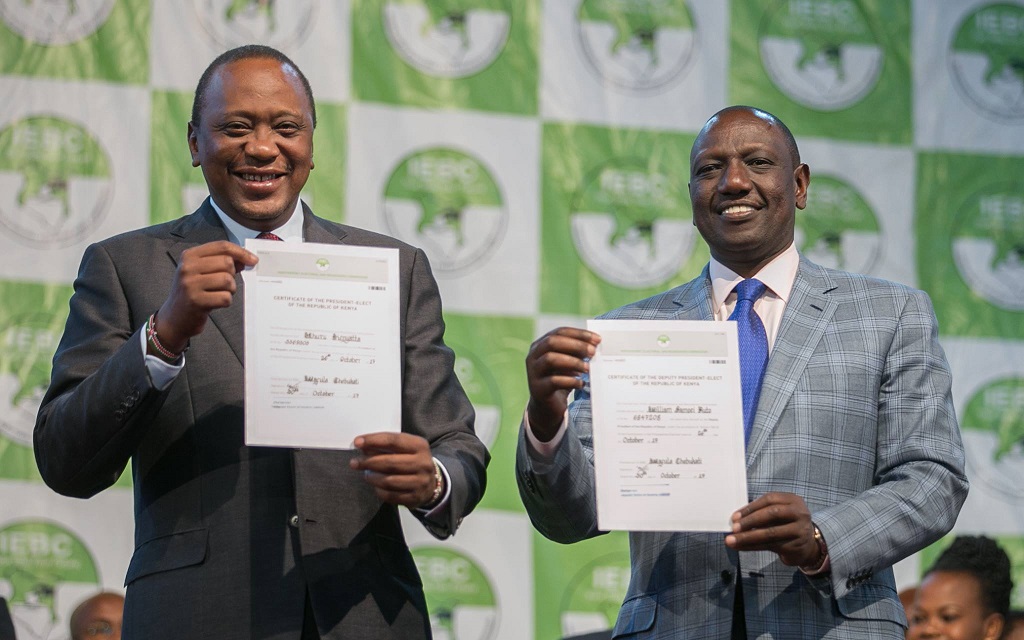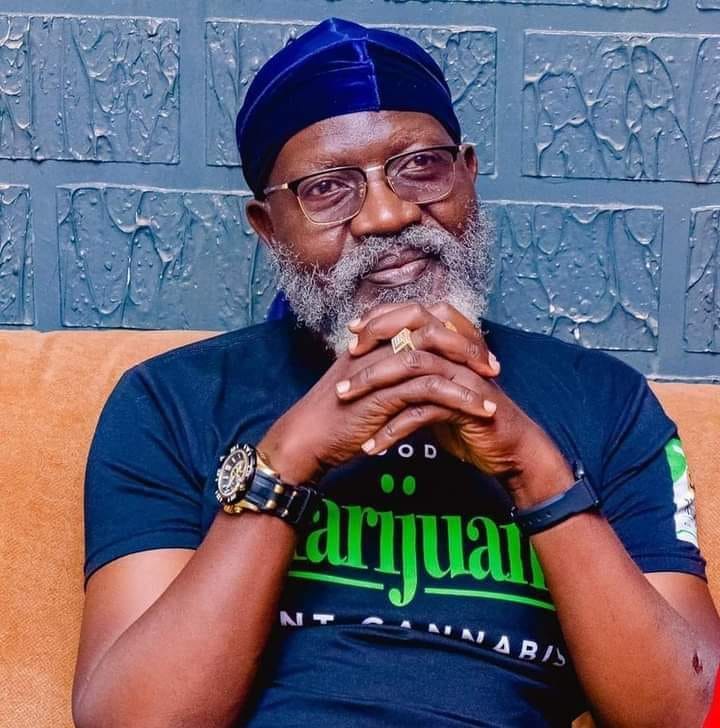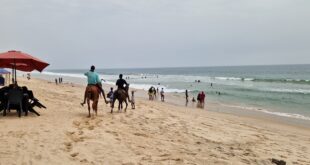In a feature on the general elections in Kenya holding on 9 August, our senior contributing editor, Mickie Ojijo, analyses democracy in the east African country and explains why the system is not delivering the expected dividends to the people
—
As Kenya’s general election, scheduled for 9 August 2022, enters the homestretch, horse trading and amalgamations of political entities have entered high gear.
The country has been awash with glittering billboards and posters, paid print and television ads, as campaign caravans with huge speakers mounted atop mini buses blare high decibel local rhythms to lure out the people to listen to economic miracles the contestants have in store.
During this period, the poor can don new t-shirts from different parties as handouts and alcohol flows freely in a carnival-like atmosphere until the polling day when politicians and voters finally part company.
This kind of arrangement only demonstrates the level of insignificance of democratic norms in the country.

Kenya is a country where supporters of a political party can wake up one morning and realise their leader has defected to a rival party or formed a new one complete with different slogans, symbols and colours!
The politicos go to great lengths to attract large crowds to their rallies for the optics. The crowds that keep on bulging every year are often made up of bored jobless people, the self-employed in the lower social strata or the wananchi, in local parlance. The larger the crowd, the greater it is of importance for politicians’ egos.
The Wananchi have since realised the folly of voting since politicians have not delivered on their promises of increased opportunities and better living standards. Subsequently, many of the young in the demographics have altogether avoided voter registration or abstained on the polling day as protesting politicians cry voter apathy.
BETRAYALS
Greed has turned political institutions into a tool of barter trade. With a population of 45 million people, the proliferation of political parties to 83 is the highest per capita in Africa. It is above Uganda, Tanzania and Rwanda combined, and Kenya’s rent-seekers are spoiled for choices.
Aspirants weary of the rigmaroles of party primaries, rigging and early humiliation, can buy nomination certificates. Whoever is unable to afford one runs as an ’independent’.
This indeed justifies the contempt Socrates had for democracy. He summarised his scepticism of universal suffrage as voting not being a random intuition, but rather a commitment that requires skill like any other. He added it must systematically be taught to people. The Socrates proclamation befits Kenya’s situation where democracy has been supplanted by commercial interests.

After the handshake between the opposition leader, Mr Odinga and President Uhuru Kenyatta in March 2018, the two contrived a plan to chart a common political future and the Building Bridges Initiative (BBI) was born.
Members of the BBI went around posing guided questions for pre-determined answers to change the Constitution in a referendum but the Supreme Court saw it differently and halted the process.
Undeterred in their quest the two sponsored a Political Parties’ Amendment Bill which became law early in the year. The Act gave coalitions legal identity and what became a poison chalice to the sponsors of the Bill is the provision which pegs the exit period to six months before an election and three after.
The 26 fringe parties in the Azimio coalition found themselves trapped when Mr Odinga and President Kenyatta prevailed upon them to withdraw their candidates from contesting the seats the two had reserved for their aspirants, a move that irked the small partners.
The junior partners declined to step down and rightfully so since they had already paid for the nomination certificates to the owners of their parties and were dragged into the coalition against their will.
The Kenya Kwanza Alliance of Deputy President William Ruto whose allies vehemently opposed the Bill in Parliament was not spared either. Political rallies of both camps were marred by disorderly conduct. Rival candidates hurl epithets at each other and exchange blows on the podium to the consternation and amusement of their supporters.
Others boldly impugned the provision of the Party Act to support other opponents. Former Vice President and Wiper party leader, Mr Stephen Kalonzo Musyoka – a de facto leader of his community – and the Machakos governor Mr Alfred Mutua, successfully tested the fickleness of the Parties’ Act.

Kalonzo, a jaunty politician who earned the nickname “watermelon” for being easily swayed, was audacious, demanding Mr Odinga, Azimio’s founder and flag bearer, to step down for him if he was to join the coalition.
When it became clear that Ms Martha Wangere Karua was the preferred running mate to Mr Odinga, Mr Kalonzo threw tantrums and declared his presidential bid to arm-twist his co-principals to rescind the decision in his favour.
Mr Kalonzo was quick to abandon his running mate and returned to the fold after Odinga promised him the post of Chief Minister which does not exist in the Constitution.
It did not take long before Mr Kalonzo jolted the coalition again. He picked a dejected former Nairobi governor, Mr Mike Mbuvi Sonko, to challenge Azimio’s candidate for the same seat at Mombasa County.
Sonko had been impeached in 2020 for ineptitude and a raft of other accusations and hounded out of office. The Supreme Court intervened and found him unfit to hold public office. He immediately decamped to the DP’s camp, leaving his sponsor with egg on his face.
It is also claimed supremacy war between Kalonzo and the Machakos governor, Alfred Mutua, may have contributed to the decision for the latter to ditch the Azimio coalition.
Kitui governor Ms Charity Ngilu, an astute politician and veteran of opposition politics, dropped her bid to recapture her seat after a restive Kalonzo imposed a rival candidate for the County seat.
ELECTION MANIFESTOS
They say people don’t replicate failures but learn from them. Mr Odinga appears determined to replicate parts of Tanzania’s Marxist doctrines of the Azimio La Arusha of 1967.
The Arusha Declaration, authored by Tanzania’s first president Mr Julius Kambarage Nyerere, introduced a socialist system that later plunged his country into economic doldrums.
As experts had predicted Tanzania became a basket case, and, in 1985 Nyerere threw in the towel to concentrate on the Southern African Development Community (SADC) he founded in 1980 after the collapse of the East African Community.
In his manifesto of economic liberation, Mr Odinga plans to set up manufacturing factories in all 47 Counties. Nyerere did the same. His State-owned 25 regional industries went down with the Self-Reliance or Ujamaa policy. Nyerere believed supply would determine demand and spur economic activities.
The monthly stipend of Ksh6,000 for vulnerable households Mr Odinga proposed is a recipe for the emerging culture dependency.
Tanzania is grappling with a similar concept that Chama Cha Mapinduzi (CCM) introduced in the 2000 elections to outwit the emerging opposition. CCM pledged to dole out money to the poor picked at random.
According to the Tanzania Social Action Fund (TASAF) tasked with the disbursement of the money the number of both genuine and face beneficiaries has exponentially increased but not the death rate. The fund has become a bottomless pit but an indispensable campaign tool to the CCM party they can only withdraw at their peril.
The deputy president chose not so much a dissimilar path by labelling his blueprint “The Plan” observers consider to be an embellished elaborate variance of Azimio’s 10-point manifesto meant for a specific erudite group to interpret.
Even though Ruto’s “Bottom Up” philosophy has been well received in some quarters and more so by the downtrodden its fundamental dictates are immersed in its 66-pages.
MOTIVATION
It is not far-fetched to assume the motivation for elective positions in the country is the hyper-inflated pay, grandeur and underhand deals, making the legislative assembly one of the most sought-after employers. At €108.000 pay cheques per annum, legislators are among the highest paid public servants in the world. And to add insult to injury, Kenya’s MPs determine their salary scale!
To the political class, the government is the most rewarding source of quick wealth. Ninety-eight per cent of wealthy indigenous Kenyans either worked for the government, did business with it through the tendering process, or engaged in illicit business with government functionaries.
The exasperating problems are articulated in the manifestos. Millions of retired workers are deprived of their livelihood as their pensions remained held up at the National Social Security Fund, for illicit transactions.
The police rob citizens in daylight and erect barricades to solicit bribes from unroadworthy vehicles in the full glare of onlookers.
In their rhetoric, politicians have been consistent in reminding Kenyans about peace when the root cause is known. The Ndungu Land Report & Graft is gathering dust in the archive and negative ethnicity had swept under the carpet.
To classify eradication of corruption as a continuous war is political deceit. The political class is averse to any solution that has been tested elsewhere.
In 2002, the late President Mwai Kibaki won the election on the anti-corruption template and vanquished the 24-year rule of KANU pilferage.
The President appointed Mr John Githongo, a former head of Transparency International (TI) as anti-corruption czar. But it did not take long before Kibaki realised his close associates, who were sustaining his presidency, and the thieves of public funds were the same. Justice Minister Kiraitu Murungi and his cohorts stormed the President’s office and demanded from John Githongo an explanation why he was choking the free flow of sleaze.
The anti-corruption czar was left to his own devices and fled to Britain from where he faxed his resignation letter.
Ms Martha Karua who took over from Kiraitu as Justice minister resigned in huff in 2008 as looting scandals mounted.
NEW BROOM
The anti-bourgeois stance of the two main contenders is that of people who arrived in the country recently. Like Themistocles, the saviour of Athens in 450 BC – their rhetoric portrays them as Themistocles Kenyans had been waiting for.
The catalogues of freebies of the leading contenders portray Kenya as a country with an excessive budget surplus which can lead to fiscal indiscipline and excessive borrowing.
The two have ignored the ravage of the Covid-19 pandemic and the escalating inflationary costs of imports caused by the Russian invasion of Ukraine and instead, apportion blame on one another.
Not to forget their laissez-faire attitude towards the cartels exploiting Food Aid that has impeded remedial action against Kenya’s perennial drought.
As President Kenyatta and his deputy faced charges of crime against humanity at The Hague in 2012 they pledged unsustainable projects merely for political expediency. They had to win the impending election at all costs.
That victor has left Kenya reeling in debts amounting to Ksh9TR (€74.1bn) with unfinished projects.
Professor George Wajackoyah of the Root party – a debutant in the presidential election, lifted the spirit of the Rastafarian community with his surreal plans of boosting the moribund economy and debt repayment. Though crude and smacking of the Islamic Sharia law, his commitment to tame corruption resonates well with the public.
Wajackoyah’s intention to legalise the planting and export of Cannabis Sativa for therapeutic use is within reason but lacks specific market demand. And Church leaders disagree.
Much cannot be said of the Agano party candidate, David Mwaure Waihiga, a lawyer by profession, known for his ascetic demeanour. Mr Waihiga is convinced piety can influence the political economy and create jobs even though, in economic theory, no problem contains prayers as part of the solution.
What is more confounding is the unemployment crisis and the solutions politicians offer. Politicians perceive every jobless person as a potential entrepreneur whose only handicap is capital. Success from the previous budget allocations for the Youth fund remains a mystery.
Candidates in this election have outlined the same in their manifestos.
Former German Chancellor, Gerhard Schroeder in his first term in 1998 introduced a policy that gave job seekers access to small bank loans for business, called “ich AG”. Without business experience, three years along the line, 95% of the businesses collapsed, leaving the owners insolvent and in debt they did not bargain for.
To paraphrase Albert Einstein; problems cannot be solved by the same level of thinking that created them. Except for Martha Karua, the leaders dominating Kenya’s political landscape were life members of the despotic KANU regime known for malfeasance and looting.
OATH AND BETRAYAL
Question abounds about the exodus of the Kikuyu ethnic group from Mount Kenya to the Kenya Kwanza Alliance, led by William Ruto. The rebellion was triggered by the hegemonic attitude of the older generation adopted by the new ones. Uhuru Kenyatta’s failure to groom a successor from the community was not taken lightly.
The indigenous Kiambu residents took an oath in the mid-60s, not to allow the political power, to cross the River Chania, Uthamaki ndugereka, in Kikuyu.
The river runs between the Kikuyus in Kiambu and the rest, notably, from Kirinyaga to Nyeri – the domicile of the late President Mwai Kibaki and Josiah Mwangi Kariuki, a flamboyant socialist politician who was assassinated in 1975 by the powers that be for criticising Jomo Kenyatta’s tendency of land grabbing.
This was to be reaffirmed by a solemn oath in 1969, in which the rest of the Mount Kenya folks were incorporated to commit to the oath – ostensibly against the uncircumcised Luo people from Western Kenya after the assassination of Economic Planning Minister, Tom Mboya, also a Luo.
Despite the impending indictment at The Hague, the Kikuyu community from all political parties reminded President Kibaki of the oath of keeping the realm in perpetuity within the community. Kibaki obliged and passed the baton to Uhuru Kenyatta.
Soon after gaining independence in 1963, in his wisdom to settle the land issue that precipitated the Kikuyu insurgency against the White settlers Mzee Jomo Kenyatta, Kenya’s first president did the unthinkable.
Kenyatta abandoned the nationhood building, receded into an ethnic cocoon, surrounded by the infamous acolytes, derisively referred to as the “Kiambu Mafia”.
Having worked as a farmhand in England and studying Marxism in Moscow, Kenyatta was familiar with the land rules under both the socialist and capitalist economies. And he must have stumbled on Irish history and its Potato Famine of 1845 – 1849 during which over 2.5 million Irish emigrated to North America and Australia – and not to Wales, Scotland or England.
In Kenya and some parts of Rift Valley, in particular, migrants outnumber their hosts. Compounding the situation was the inability of the two communities to integrate.
With farming and trading skills from White settlers, the Kikuyu diaspora not only dominated the two vital sectors but also politics. The disputed election of 2007 and the violence that left 1,500 people dead and another 600,000 fleeing their homes was a result of that unequivocal support for Kibaki and not Odinga and his close ally, William Ruto.
The fear of the repeat of 2007 and the exodus therefrom left both diaspora and the folks in Mt Kenya to take refuge in Ruto’s political camp. Coupled with a Kikuyu running mate, a transitory assurance of peace is guaranteed. A scenario that helped Ruto to consolidate votes.
When politicians cite the word peace, they perhaps refer to the quiescent feud in Rift Valley.
The raging internecine war of attrition between Kenyatta and his deputy was not unexpected. In a country where political alliances or coalitions are not based on ideology, betrayal is imminent.
Politicians are quick to remind the folks about “unity of purpose”. It is peculiar for archrivals with incompatible ideologies to form a pact unless its intended purpose is ulterior.
Ruto, a political fox had seen it coming. He capitalised not only on the anxiety of the diaspora but also on the trappings of the office. His spirited effort and a well-organised campaign have led to an election whose outcome is too close to call.
© AfricanCourierMedia, 2022
 THE AFRICAN COURIER. Reporting Africa and its Diaspora! The African Courier is an international magazine published in Germany to report on Africa and the Diaspora African experience. The first issue of the bimonthly magazine appeared on the newsstands on 15 February 1998. The African Courier is a communication forum for European-African political, economic and cultural exchanges, and a voice for Africa in Europe.
THE AFRICAN COURIER. Reporting Africa and its Diaspora! The African Courier is an international magazine published in Germany to report on Africa and the Diaspora African experience. The first issue of the bimonthly magazine appeared on the newsstands on 15 February 1998. The African Courier is a communication forum for European-African political, economic and cultural exchanges, and a voice for Africa in Europe.

































